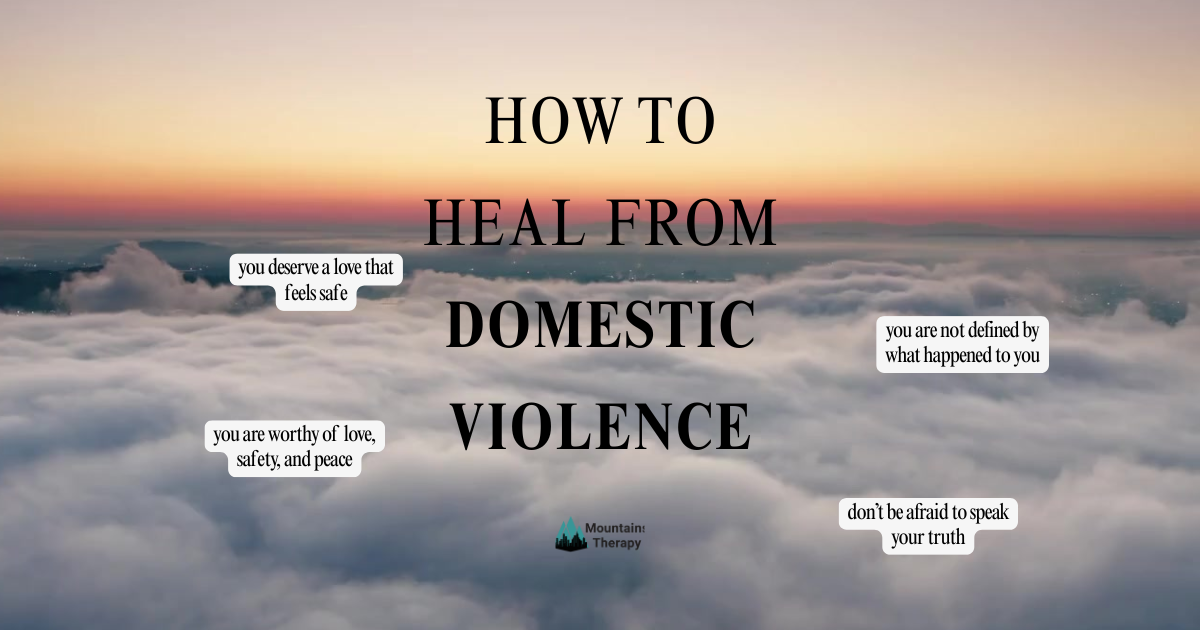How to Heal From Domestic Violence: Understanding, Recovery, and Support in Montclair, NJ
Learn more about Trauma Therapy for Domestic Violence.
In This Blog, You’ll Learn
✅ What domestic violence means and how it starts
✅ How domestic violence affects mental health, the brain, and relationships
✅ Why survivors often find it difficult to leave or return to abusive relationships
✅ What legal and public record considerations exist in domestic violence cases
✅ How domestic violence impacts children and families
✅ Steps you can take to start healing and rebuilding your life
✅ How therapy at Mountains Therapy in Montclair, NJ can support long-term recovery
Domestic violence can take many forms:
physical,
emotional,
psychological,
financial, or
verbal. Its effects reach far beyond the moment of abuse. It impacts confidence, relationships, and mental health, often leaving survivors feeling powerless, anxious, or unsafe. At
Mountains Therapy in Montclair, NJ, we help survivors and families begin to heal, rebuild safety, and rediscover inner strength through trauma-informed, compassionate care.
What Domestic Violence Means
Domestic violence (often written as domesticviolence) refers to a pattern of controlling, coercive, or abusive behaviors used to gain power over another person in a relationship or household.
What domestic violence looks like can vary widely and may include:
- Physical Abuse – Hitting, slapping, punching, kicking, restraining, shoving, or using physical force in any way. It can also include threats of violence, destroying property, or using weapons to intimidate.
- Behavioral Signs: The person may start changing locks or installing extra security, hiding bruises with clothing or makeup, or becoming anxious about being late or not answering calls. They might also make excuses for injuries or seem hyper-alert at home.
- Verbal or Emotional Abuse – Name-calling, insults, humiliation, intimidation, gaslighting, or constant criticism. It can sound like “You’re worthless,” “No one else would love you,” or “You’re crazy.” These behaviors are used to break down confidence and make victims question their reality.
- Behavioral Signs: Victims may apologize excessively, avoid eye contact, second-guess their decisions, or appear withdrawn and fearful. They might stop expressing opinions, become quiet around their partner, or seem overly careful not to “cause problems.”
- Financial Abuse – Controlling or withholding money, restricting access to bank accounts, sabotaging employment, forcing a partner to account for every dollar, or taking control of paychecks. This often traps victims and makes it harder to leave the relationship.
- Behavioral Signs: The victim may suddenly quit their job, ask to borrow money, or seem nervous discussing finances. They might mention that their partner “handles everything” financially or hide small amounts of cash for emergencies.
- Sexual Coercion or Forced Intimacy – Forcing or pressuring a partner into sexual activity without consent, using guilt or threats to obtain sex, or disregarding boundaries. Consent is never negotiable—even within marriage or long-term relationships.
- Behavioral Signs: Survivors may avoid physical touch, flinch when approached, or seem uncomfortable with intimacy. They may express confusion or guilt about sexual boundaries or mention being pressured when they said no.
- Psychological Manipulation and Isolation – Turning friends and family against the victim, monitoring their phone or location, limiting contact with others, spreading lies, or using jealousy and guilt to control. Over time, victims may feel they have nowhere to turn.
- Behavioral Signs: The person may stop seeing friends and family, change social media accounts, or avoid answering calls in front of their partner. They may appear nervous when speaking about personal life or seem to constantly “check in” with their abuser.
Domestic violence can happen to anyone, regardless of gender, background, or status. It can also be verbal, psychological, or emotional—not just physical. Abuse can even occur between a parent and child, particularly when one uses fear or control to dominate the other.
📝 Checklist: Signs You May Be Experiencing Domestic Violence
If you’re unsure whether what you’re experiencing is abuse, these questions can help you reflect:
- Do you feel afraid of your partner or family member most of the time?
- Does your partner insult, humiliate, or criticize you regularly?
- Do they control who you see, where you go, or how you spend money?
- Have they ever pushed, slapped, restrained, or physically hurt you?
- Do they threaten to harm you, your children, or your pets?
- Do they monitor your phone, messages, or location?
- Do they monitor your on home cameras?
- Have they pressured or forced you into sexual acts you didn’t want? Or do they take pictures of you during sexual encounters?
- Do they make you feel guilty for setting boundaries or saying no?
- Do you feel isolated from friends, family, or coworkers?
- Have you changed your behavior or personality to avoid upsetting them?
Behavioral Signs You Might Notice in Yourself or Others:
- Double-checking locks, changing doors, or installing extra security for fear of being followed or harmed
- Hiding money, documents, or keys as safety precautions
- Avoiding certain topics, people, or places to prevent conflict
- Constantly apologizing or minimizing what’s happening
- Wearing clothing to cover bruises or marks
- Suddenly withdrawing from friends or work without explanation
- Feeling the need to “walk on eggshells” to stay safe
If you recognized several of these signs, you may be in an unsafe situation. Remember: none of this is your fault.
At Mountains Therapy in Montclair, NJ, our trauma-informed clinicians provide a safe, nonjudgmental space where you can begin to process what happened, rebuild safety, and heal.
How Domestic Violence Starts and Why It Continues
Many survivors describe that abuse starts gradually. It may begin with criticism, jealousy, or isolation before escalating into threats or physical aggression. Where Domestic Violence Happens: Abuse can happen anywhere: at home, in same-sex or heterosexual relationships, and across all cultures and income levels.
- Why domestic violence happens: power, control, unresolved trauma, substance use, or learned behavior.
- Why victims don’t leave: fear, financial control, children’s safety, shame, or emotional manipulation.
- How domestic violence affects the brain and mental health: ongoing trauma triggers chronic stress responses, changes brain chemistry, and can lead to depression, anxiety, PTSD, or emotional numbness.
- Where are domestic violence rates highest? Studies suggest higher rates occur where resources, education, and mental health access are limited.
- Are domestic violence rates increasing? Reporting rose during times of stress and isolation, such as the pandemic, but experts note underreporting still hides the full scope.
How Domestic Violence Affects Women, Children, and Families
- How domestic violence affects women: survivors may struggle with fear, self-doubt, and trauma responses long after leaving.
- How domestic violence affects children: witnessing violence can cause anxiety, aggression, poor concentration, and attachment difficulties.
- How domestic violence affects families: cycles of tension and fear disrupt trust and emotional stability for everyone involved.
Legal, Social, and Record Considerations
- Are domestic violence records public / reports public record? This varies by state; police or court records are sometimes public, though sensitive details can be sealed.
- Can domestic violence be expunged? In certain cases, depending on state laws and outcomes.
- Can domestic violence charges be dropped / by the victim? Victims may withdraw statements, but prosecutors can still proceed with evidence.
- Can domestic violence be a felony? Yes—especially when injuries, weapons, or repeat offenses occur.
- Will domestic violence affect child custody or citizenship? It can; courts and immigration authorities prioritize safety and may review past incidents.
- When was the Domestic Violence Act passed? In the U.S., the Violence Against Women Act (VAWA) was signed in 1994, providing crucial protections and funding for survivors.
- When is Domestic Violence Awareness Month? Every October, awareness campaigns aim to educate and prevent abuse.
How to Heal From Domestic Violence
Healing from domestic violence takes time and support, but recovery is possible. Here’s how to begin:
- Prioritize Safety – Create a safety plan with a trusted friend, therapist, or advocate.
- Reach Out for Support – Contact the National Domestic Violence Hotline at 1-800-799-SAFE (7233) or visit thehotline.org for confidential chat and resources.
- Seek Professional Help – Trauma-informed therapy provides a safe space to process pain and rebuild trust.
- Rebuild Self-Confidence – Healing involves rediscovering your worth and learning healthy boundaries.
- Connect with Others – Join survivor support groups or community programs that empower and educate.
Healing Through Therapy at Mountains Therapy in Montclair, NJ
Therapy can help survivors process trauma, develop coping strategies, and restore a sense of control. At Mountains Therapy, our clinicians use evidence-based methods that focus on safety, healing, and empowerment.
We support survivors through:
- Individual Therapy
- Family Therapy
- Couples Counseling
- Therapy for Kids & Teens
- Online Therapy for clients in NJ, NC, FL & UT
- In Person therapy in Montclair, NJ
How Therapy Helps With Domestic Violence
At Mountains Therapy, we integrate multiple therapy approaches to help survivors heal emotionally, mentally, and relationally.
- ACT – Acceptance Commitment Therapy for Domestic Violence: helps survivors accept painful memories while focusing on values-based healing.
- CBT – Cognitive Behavioral Therapy for Domestic Violence: teaches survivors to reframe harmful thought patterns and reduce guilt or fear.
- DBT – Dialectical Behavioral Therapy for Domestic Violence: strengthens emotional regulation, mindfulness, and distress tolerance.
- EFT – Emotionally Focused Therapy for Domestic Violence: builds emotional safety and trust for couples recovering from trauma.
- MBT – Mindfulness-Based Therapy for Domestic Violence: promotes grounding, relaxation, and awareness of body sensations after trauma.
- Narrative Therapy for Domestic Violence: empowers survivors to rewrite their story from one of harm to one of strength and hope.
- Psychodynamic Therapy for Domestic Violence: helps explore early experiences that may influence current relationship patterns.
- SFT – Solution Focused Therapy for Domestic Violence: focuses on achievable goals and small, empowering steps forward.
- TF-CBT – Trauma Focused Cognitive Behavioral Therapy for Domestic Violence: effective for both children and adults healing from abuse and PTSD.
Take the First Step Toward Healing
Healing from domestic violence is possible. You are not defined by what happened to you—you are defined by how you rise beyond it. If you’re ready to begin, Mountains Therapy in Montclair, NJ provides a compassionate, safe environment where your voice is heard, and your healing journey is supported every step of the way.














